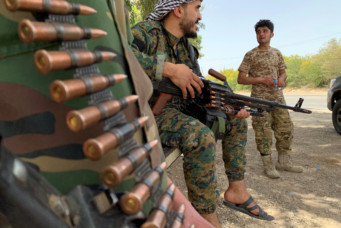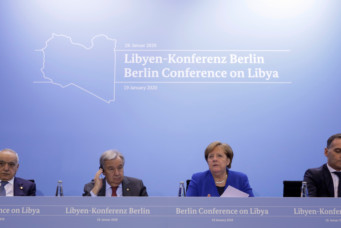Strategic Actors in Libya
Political Scientist Lisa Anderson explores how the local players in the Libyan conflict affect the decision-making of states, both in North Africa and beyond.

A Libyan man waves a Libyan flag during a demonstration to demand an end to the Khalifa Haftar’s offensive against Tripoli, in Martyrs’ Square in central Tripoli, Libya April 26, 2019. REUTERS/Ahmed Jadallah
Lisa Anderson, 69, president of the American University in Cairo (AUC) from 2011–2016 and its provost in the three preceding years, is an expert on Libyan affairs and higher education in the United States and the Middle East. She authored Pursuing Truth, Exercising Power: Social Science and Public Policy in the Twenty-first Century in 2003 and The State and Social Transformation in Tunisia and Libya, 1820-1980 in 1986.
Anderson is now senior lecturer and dean emerita at the School of International and Public Affairs at Columbia University, where she served as dean for a decade before coming to AUC. She also chaired Columbia’s political science department and directed its Middle East Institute.
Anderson discusses the ongoing power struggles in Libya and their implications in the country and beyond. As peace negotiations sputter, the changing trajectory of the conflict has serious consequences for North Africa as a region.
Cairo Review Assistant Editor Sydney Wise recently spoke with Anderson about this North African crisis.
Sydney Wise: What spillover effects from the conflict in Libya are felt by the North African states?
Dr. Lisa Anderson: Well, I actually think there’s an enormous amount of anxiety, probably all the way across North Africa. Because the borders of Libya—particularly the southern borders— are for all intents and purposes completely unpoliced.
This means that anything that’s happening in Libya could be contagious and affect the Sahara, southern Egypt, Algeria, and the Sahel. So I think there’s a real concern that, if this kind of ongoing violence continues, it’s pretty likely to metastasize elsewhere in the region. And obviously, nobody wants that.
Sydney Wise: So, does sharing a border with Libya make a state more vulnerable?
Dr. Lisa Anderson: I think that’s certainly how the border states themselves feel. Egypt, for example, is putting more resources into policing the Libyan border than they’d like to be doing.
It’s worth keeping in mind, though, that Libya has been a bit of a trial for the border states for decades. Long before the uprising against longtime leader Muammar Gaddafi, there was a sense that he and his government were, “excessively independent-minded”… Let’s put it that way.
So, border states couldn’t really trust him, and they couldn’t really trust that he was policing the borders himself. I think borders are a particular concern because today, borders in general are far, far more permeable borders for things like weapons than they were in Gaddafi’s era. But there was a reasonable concern even then that the Gaddafi government was unpredictable. It was hard to know what was likely to happen. So Libya’s neighbors had to spend more financial resources, time and attention, military assets, and so forth on those borders than they would’ve liked.
Sydney Wise: How else are the North African states responding to these challenges, besides just policing the borders?
Dr. Lisa Anderson: I wouldn’t say that all the North African states are reacting the same way. The Moroccans, for example, don’t have a great deal of involvement in the day-to-day activities in Libya. But it’s certainly true that everyone—the Egyptians, and to a lesser extent the Algerians and Tunisians—have joined other countries in the region in trying to manipulate the developments on the ground within Libya.
So what we see is a lot of proxy wars, utilizing the Libyan conflict for regional purposes. This has exacerbated the conflict and made it almost impossible to solve, because all the local combatants in Libya think they will have an essentially endless supply of arms and money and support from outside the country.
That mischief does not come from within Libya, the immediate bordering countries, nor even the North African countries, but from countries a little bit further afield. That’s a bit puzzling because these outside powers don’t have the same kind of security concerns that the bordering countries have.
Sydney Wise: How do non-state groups in the region play into this scenario?
Dr. Lisa Anderson: I think that the presence of non-state groups is one of the reasons why, for example, the United Arab Emirates (UAE) has been very active in backing the [Khalifa Belqasim] Haftar group within Libya. The UAE is concerned that non-state actors associated with the Muslim Brotherhood and some of the Muslim movements in the country or the region have been involved in Libya, and Haftar has promised to be a sort of a bulwark against such groups.
So in some measure, you can see an effort on the part of state actors to inhibit, discourage, and defeat non-state actors, and Libya is a proving ground for that. States are backing Haftar because they believe that he would be a conventional state actor, were he to gain control of the country—unlikely to use Libyan resources to support non-state actors elsewhere in the region.
So I think that’s part of states’ strategic thinking about Libya; this is a place where non-state actors, particularly Islamist movements, can be controlled, if not defeated. Whether that’s an accurate assessment or not is a different question.
Sydney Wise: Is enough media attention paid to the role of those non-state groups in the conflict?
Dr. Lisa Anderson: At this point, most of those groups have been splintered or dispersed. The Islamic State in Iraq and Syria (ISIS) had a big presence, and for a while controlled a fair amount of territory in the middle of the country. Everyone banded together to defeat them and they just shattered.
Now, the concern for obvious reasons is that those shards go elsewhere in the country, or elsewhere in the region, and re-develop as cells in other places. But at the moment, there was a lot of attention on non-state actors like ISIS in Libya.
At this point, it’s not clear that there is an organized group of Islamists. There is clearly some support for what one might call “old guard Islamists,” you know, affiliates of the Muslim Brotherhood, in the city of Misrata. That is one of the reasons why Turkey is involved there, because the Turkish government still hopes to revive that Muslim Brotherhood Islamist trend.
However, the landscape—in the region as a whole, and in Libya particularly—has gotten very complicated. As each of these groups raise their profile, they are subsequently decapitated and then end up in alliances of convenience. Even Haftar is working with Salafi groups. This suggests that, over the long run, he’s not going to be as rigorous about his opposition to non-state actors or Islamist groups as he had originally claimed. On the other hand, the Salafis tend to be well understood and tolerated by Gulf countries.
The landscape within the non-state actor Islamist trend has gotten very confused. One of the things that’s difficult, for both analysts and strategists, is trying to untangle those knotted relationships.
Sydney Wise is contributing editor at the Cairo Review of Global Affairs. Her past work has been published at the Boston Consortium for Arab Region Studies. On Twitter: @sydneyywisee
Read More



